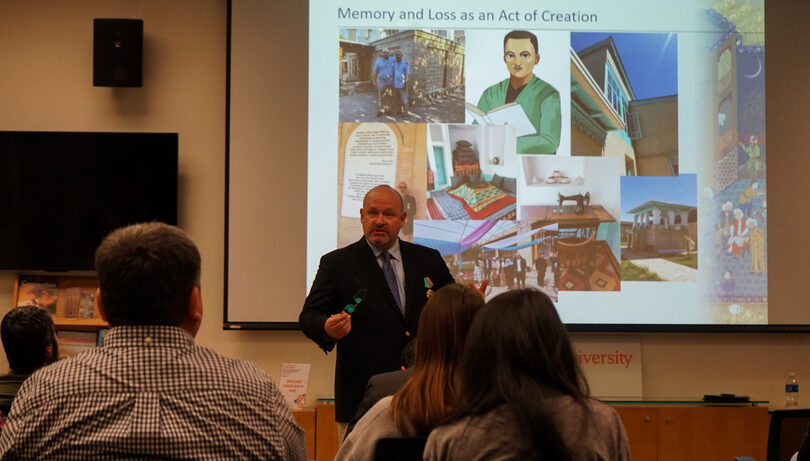New exhibit at Bird Library highlights Uzbekistan’s culture, history

Mark Reese spent around 25 years in Central Asia and served in Uzbekistan from 1994 to 1996. He spoke to students and community members on Tuesday afternoon in Bird Library. Leanne Rivera | Staff Photographer
Get the latest Syracuse news delivered right to your inbox.
Subscribe to our newsletter here.
Mark Reese spent around 25 years in central Asia and served in Uzbekistan from 1994-1996 as a volunteer for the Peace Corps. During his time in Asia, Reese worked on translating Abdullah Qodiriy’s novel, “O’tkan Kunlar,” the first full-length novel in the Uzbek language when it was released in 1925, into English. Beyond his passion and efforts for understanding Uzbek culture, the process was also a way for Reese to escape from his day-to-day life.
“Translating the novel was a way for me to sort of soothe my nerves,” Reese said. “I could have a really bad day on the Afghan-Pakistan border, but I could sit there and get a chapter of ‘O’tkan Kunlar’ done, and I would feel a little bit better about the world.”
Reese stopped by Syracuse University to kick off the formal opening of The Uzbekistan Cultural Exhibition, Bird Library’s new exhibition. From now until May 15, community members have the opportunity to learn about Uzbekistan culture through the various artifacts that are on display. Items range from traditional clothes to instruments and dishware. Information is also provided throughout the exhibition about the rituals and various cultures of the country.
Mirjakhon Turdiev, president of SU’s Central Asia and Caucasus Student Union, said he wants more people in the SU community to learn about Uzbekistan’s cultures. In an effort to do this, students and community members were welcomed into the Peter Graham Scholarly Commons room of Bird Library for the exhibition. Pins were distributed to visitors showcasing different culturally significant items of Uzbekistan.
Reese’s talk focused on his experience in Uzbekistan and how he immersed himself in the cultures of the country. “O’tkan Kunlar” is set in Uzbekistan and is considered a political love story that warns generations to come that political reform is important, but so is recognizing one’s past and heritage. Reese’s English translation of the novel is called “Bygone Days.”
“One of the amazing things about Qodiriy and his novel is he speaks directly to the reader, and it’s really powerful as a translator,” Reese said.
Turdiev said he was extremely excited to welcome Reese to SU and even called him a “very old friend” of Uzbekistan. Turdiev also expressed how great it is to see his American friends learn about Uzbekistan culture and share that knowledge with others.
One of the amazing things about Qodiriy and his novel is he speaks directly to the reader, and it's really powerful as a translator,Mark Reese, President and CEO of Suhbat, LLC,
Turdiev said Reese was a great speaker for the exhibit’s formal opening because “O’tkan Kunlar” talks a lot about cultural ethnographies, or descriptive studies about cultures, which the pieces throughout the exhibition also show. Turdiev said that Reese’s talk was also a great learning experience for him.
“I found it to be a very amazing talk, Mark did a really good job with engaging. I even found that I learned a lot of new things from his perspective,” Turdiev said.
Fellow attendee Sevara Abduvalieva shared similar sentiments but also added how Reese’s talk and the art on display offered an interesting insight into Uzbekistan cultures.
Abduvalieva and fellow freshman Nilufar Sobirova both came to the event because a friend told them about it. Sobirova said she was especially eager to go because she’s Uzbek and wanted to learn more about “O’tkan Kunlar.”. Abduvalieva was particularly interested to hear from someone who took the time to translate the novel into English.
Reese stressed the importance of paying attention to historical events and how reading books from different cultures can offer audiences important perspectives on the world and on the past. Sobirova said Reese’s attention to Uzbekistan cultures and his eagerness to share this information was a great way to kick off the exhibition.
“I really loved how he really interacted with locals during his time in Uzbekistan. He really learned about what Uzbeks are, and that’s what I thought was really interesting,” Sobirova said. “I’m so glad that he went out of his way to really live with the locals and see the real life of Uzbeks.”





